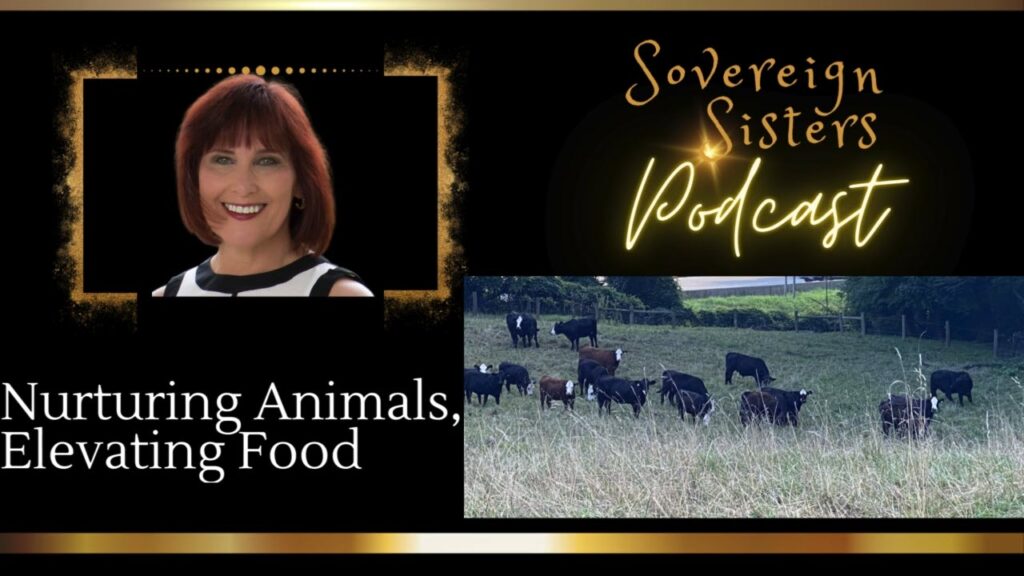Compassionate Farming vs. Industrial Agriculture
In this recent episode of the Sovereign Sisters Podcast, I had the chance to delve into the contrasts between humane, sustainable farming and the industrial practices that dominate much of the agricultural landscape today. While I want to share more about my visit to Hidden Waters Farm, I found myself compelled to first address some broader concerns that have surfaced in recent conversations and research, particularly highlighted during a powerful interview by Tucker Carlson with Casey and Calley Means.
The Dark Side of Industrial Farming
Industrial farming, particularly through Concentrated Animal Feeding Operations (CAFOs), has become the norm in modern agriculture. These facilities, where large numbers of animals are confined in tight spaces, prioritize efficiency and cost reduction over the well-being of the animals and the environment. The issues that arise from these practices are numerous:
– Environmental Impact: CAFOs contribute significantly to pollution, affecting air and water quality in surrounding areas. The waste produced in such concentrated settings often leads to contamination of local water sources, impacting not only the environment but also the health of communities nearby.
– Animal Welfare: The conditions within CAFOs are far from natural. Animals are deprived of sunlight, fresh air, and the ability to engage in normal behaviors, leading to high levels of stress, physical injury, and disease. This inhumane treatment is not just an ethical issue but also affects the quality of the food produced.
– Health Risks: One of the most concerning aspects of CAFOs is the routine use of antibiotics to prevent disease in these overcrowded conditions. This practice contributes to the growing issue of antibiotic resistance, posing a significant public health risk.
A Wake-Up Call
In a recent interview, Tucker Carlson spoke with Casey Means, a Stanford-educated surgeon, and her brother, Cally Means, a former lobbyist for Pharma and then the food industry. Their discussion sheds light on the stark realities of how industrial farming affects the food we consume and, by extension, our health. They emphasize that the method of raising animals — whether on industrial farms or in pasture-raised, humane conditions — directly impacts the nutritional quality of the meat.
Factory-farmed meat, often derived from animals raised indoors on GMO corn and soy, is higher in inflammatory omega-6 fatty acids, while pasture-raised meat, which comes from animals allowed to graze freely, contains more beneficial omega-3 fatty acids. This difference alone is a compelling argument for why we should be more mindful of where our food comes from.
Compassionate Farming: The Better Way
Hidden Waters Farm, where I recently spent a day, embodies the opposite of CAFO practices. Joe Schaffer and his team operate under the principles of regenerative farming, focusing on the well-being of the animals and the sustainability of the land. This approach not only benefits the environment but also ensures that the animals live in conditions that allow them to thrive, which in turn enhances the quality of the food they produce.
During my visit, I witnessed firsthand the calm demeanor of the animals, the healthy state of the land, and the deep respect the farmers have for their livestock. It’s clear that this model of farming — one rooted in compassion and sustainability — leads to better outcomes for both the animals and the people who consume their products.
The Ripple Effect
The contrast between industrial and regenerative farming practices is stark, not only in terms of animal welfare and environmental impact but also in the quality of the food produced and its effects on our health. The Tucker Carlson interview highlights how the systems we’ve built around food production are intertwined with public health issues and calls for a reevaluation of how we approach agriculture.
As consumers, we have the power to influence these systems by choosing to support farmers who prioritize humane and sustainable practices. By doing so, we contribute to a healthier, more ethical food system that benefits everyone — animals, people, and the planet alike.
Call to Action
If you’re interested in learning more about the impact of industrial farming and the benefits of regenerative practices, I encourage you to listen to the full Tucker Carlson interview. It’s an eye-opening conversation that connects the dots between farming practices, public health, the quality of our food and much more.
And if you ever have the chance to visit a farm like Hidden Waters, take it. There’s no better way to understand the profound difference that compassionate farming can make. Let’s work together to support a food system that nurtures both the land and the creatures who depend on it.
Until next time, let’s strive to reconnect with nature and foster a more compassionate, sustainable way of living.

LIVE MONDAYS at 4pm PT~5pm MT~6pm CT~7pm ET on Rumble and YouTube
LINKS: https://angelaatkins.taplink.ws/
Reprinted with permission from YourHealthUnbound.com


